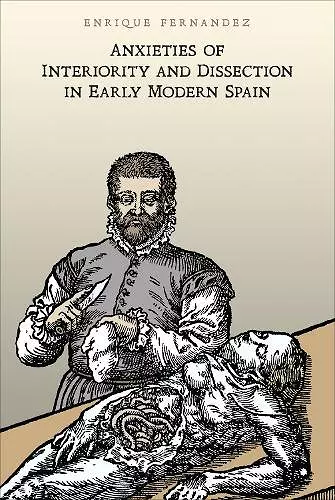Anxieties of Interiority and Dissection in Early Modern Spain
Format:Hardback
Publisher:University of Toronto Press
Published:19th Dec '14
Currently unavailable, and unfortunately no date known when it will be back

"Anxieties of Interiority is a well-researched and highly original study that offers a nuanced look at the literary production of the early modern period from an anatomical perspective. Fernandez's well-rounded knowledge of the history of anatomy and the social and political history of the early modern period serve him well here." -- David Castillo, Department of Romance Languages and Literatures, State University of New York at Buffalo "Fernandez's work will advance our knowledge of how the discourses of anatomy informed literary practice and narrative strategies, providing a semantic field as well as figurative language to enhance a different sort of cultural expression." -- Charles Ganelin, Department of Spanish and Portuguese, Miami University "Well-written, clear, and concise, Anxieties of Interiority contributes to the interdisciplinary dialogue connecting literary and scientific discourse in early modern Europe in important ways that will resonate beyond the field of Hispanic studies." -- Cory Reed, Department of Spanish, University of Texas at Austi
Anxieties of Interiority and Dissection in Early Modern Spain brings the study of Europe’s “culture of dissection” to the Iberian peninsula, presenting a neglected episode in the development of the modern concept of the self.
Anxieties of Interiority and Dissection in Early Modern Spain brings the study of Europe’s “culture of dissection” to the Iberian peninsula, presenting a neglected episode in the development of the modern concept of the self. Enrique Fernandez explores the ways in which sixteenth and seventeenth-century anatomical research stimulated both a sense of interiority and a fear of that interior’s exposure and punishment by the early modern state.
Examining works by Miguel de Cervantes, María de Zayas, Fray Luis de Granada, and Francisco de Quevedo, Fernandez highlights the existence of narratives in which the author creates a surrogate self on paper, then “dissects” it. He argues that these texts share a fearful awareness of having a complex inner self in a country where one’s interiority was under permanent threat of punitive exposure by the Inquisition or the state. A sophisticated analysis of literary, religious, and medical practice in early modern Spain, Fernandez’s work will interest scholars working on questions of early modern science, medicine, and body politics.
‘This book is original for its analysis of anatomical research and its impact on literary production. The book will be of interest to scholars of early modern Spanish literature and culture as well as historians of science and medicine in Spain.’
-- Margaret Boyle * Sixteenth Century Journal vol 68:01:2017 *‘Fernandez provides an authoritative challenge to the generalist assumptions inherent in writings concerning interiority and selfhood. His new way of thinking is bound to become a vital reference source for future research.’ -- Ana Duarte Rodrigues * Isis vol 107:02:2016 *
‘The book is well written and researched… Each chapter is an insightful reading of a group of texts.’
-- Dale Shuger * Renaissance Quarterly vol 69:01:20- Winner of Katherine Singer Kovacs Prize awarded by the Modern Language Association 2016 (United States)
- Joint winner of Best Book Award awarded by the Canadian Association of Hispanists 2016 (Canada)
ISBN: 9781442648869
Dimensions: 235mm x 161mm x 21mm
Weight: 580g
288 pages